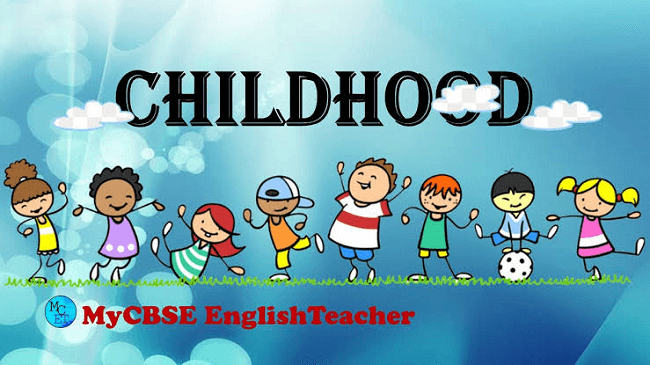Childhood Summary Class 11 EnglishIntroductionThe poet Marcus Natten wrote the poem Childhood. The poet talks about losing his youth in the synopsis of his poem. The poet describes the precise second when this innocence was gone. He discusses the many scenarios in which he may have lost his youth. The poet also comes to the realisation that things are not as they seem in the world. He remembers the moment his ideas changed. The poet considers those around him to be hypocrites. It appears that the poet will never again be able to put his confidence in those around him. He does this because he recognises their hypocrisy. Adults, in the poet's opinion, profess love but do not live it out. According to the poet, his childhood was lost in some remote location. 
About PoetA poet from Norway is named Markus Natten. The most well-known of his poems,"The Childhood," is both well-known and meaningful. In this poem, the poet laments the loss of his formative years and discusses his development from a kid to an adult. He lost track of the period when he began to think like an adult as he grew older. The poet's unspoken grief lingers in the background of the verses. Finally, his ruminations come to an end. In the face of a youngster, he may perceive the innocence of childhood. ThemeThe loss of innocence is the main topic of the poem "Childhood." The poet Markus Natten ponders when and where he lost his youth. He muses on this and emphasises the loss of trust and purity in the process of maturing. A child's inability to cope with the physical, psychological, and other changes in his personality during adolescence or childhood is a perplexing period. He transitions into the category of "young adult" since he doesn't want to identify as fully an adult or a child. He ultimately discovers the truth?that his childhood is now only a memory and that it was gone to some forgotten location. SummaryThe poet first muses and ponders the conclusion of his childhood. He ponders the point at which his childhood ended. He ponders whether that was the day when he turned older than eleven. Another possibility is the moment the poet realised Heaven and Hell did not exist and could not be located geographically. Thus, at this point, the poet was able to distinguish between reality and fantasy. The poet realises that these are made-up locations with no real-world counterparts. The poet asks the same query about losing his childhood yet another time. The poet now wonders if that was the exact moment when he started to perceive the world differently. Humans naturally experience changes in their worldviews as they age. The poet, though, seemed to be quite touched by it. Additionally, the poet realised that adults are hypocrites. This is so because grownups aren't always what they seem to be. Adults, in the poet's opinion, preach about love yet do not always act in a loving manner. The author thus thinks that adults exhibit a double-faced nature. So, did his childhood end at this point? The poet then muses on the same issue of losing his childhood once more. The author also contemplates a variety of options. The poet also reflects on the moment when he understood that his intellect belonged to him. At this point, the poet understood that he might utilise his intellect in any way he pleased. The poet also understands that his opinions are his own and cannot be influenced by anyone. One may argue that the poet realised he had free will and the ability to create his own thoughts. The poet started to recognise his uniqueness and identity at this point. Was it the day his childhood was lost, then? The poet expresses regret about his lost childhood in the final stanza. It appears that the poet would like to relive his youth. He comes to the conclusion that his childhood has disappeared into an unreachable realm. The poet treasures his now-gone youth. A baby's face is the only place where one may observe this kind of innocence. He just has pleasant, easily forgettable recollections of his youth. The poet asserts that youthful innocence only lasts up to the time of birth. AnalysisThe summary of childhood examines how innocence fades as people get older. The poem's synopsis reveals a few lessons that we may learn from. Children's faces tend to have the most innocence. We won't discover that when childhood is over, despite our best efforts. Individuals are hypocrites. True love is hard to come by. People frequently act kinder to others than they actually are. ConclusionHe comes to the conclusion that his childhood has disappeared into an unreachable realm. The poet treasures his now-gone youth. A baby's face is the only place where one may observe this kind of innocence. He just has pleasant, easily forgettable recollections of his youth. FAQ's1. What Lesson does the Poem "Childhood" Impart? "Childhood" is a poem that emphasises the issue of losing one's innocence. Markus Natten, the poet, ponders when and where he lost his youth in this poem. Markus emphasises the purity and trust he lost even as he developed intellectual independence in his endeavour to pinpoint the exact moment he grew up. 2. Does the poem's title support childhood? The poem's discussion of infancy as a stage in a person's development and as the launching pad from which young people plunge into that unknowable certainty known as life justifies the title.
Next TopicThe Pilgrim's Progress Summary
|
 For Videos Join Our Youtube Channel: Join Now
For Videos Join Our Youtube Channel: Join Now
Feedback
- Send your Feedback to [email protected]
Help Others, Please Share









